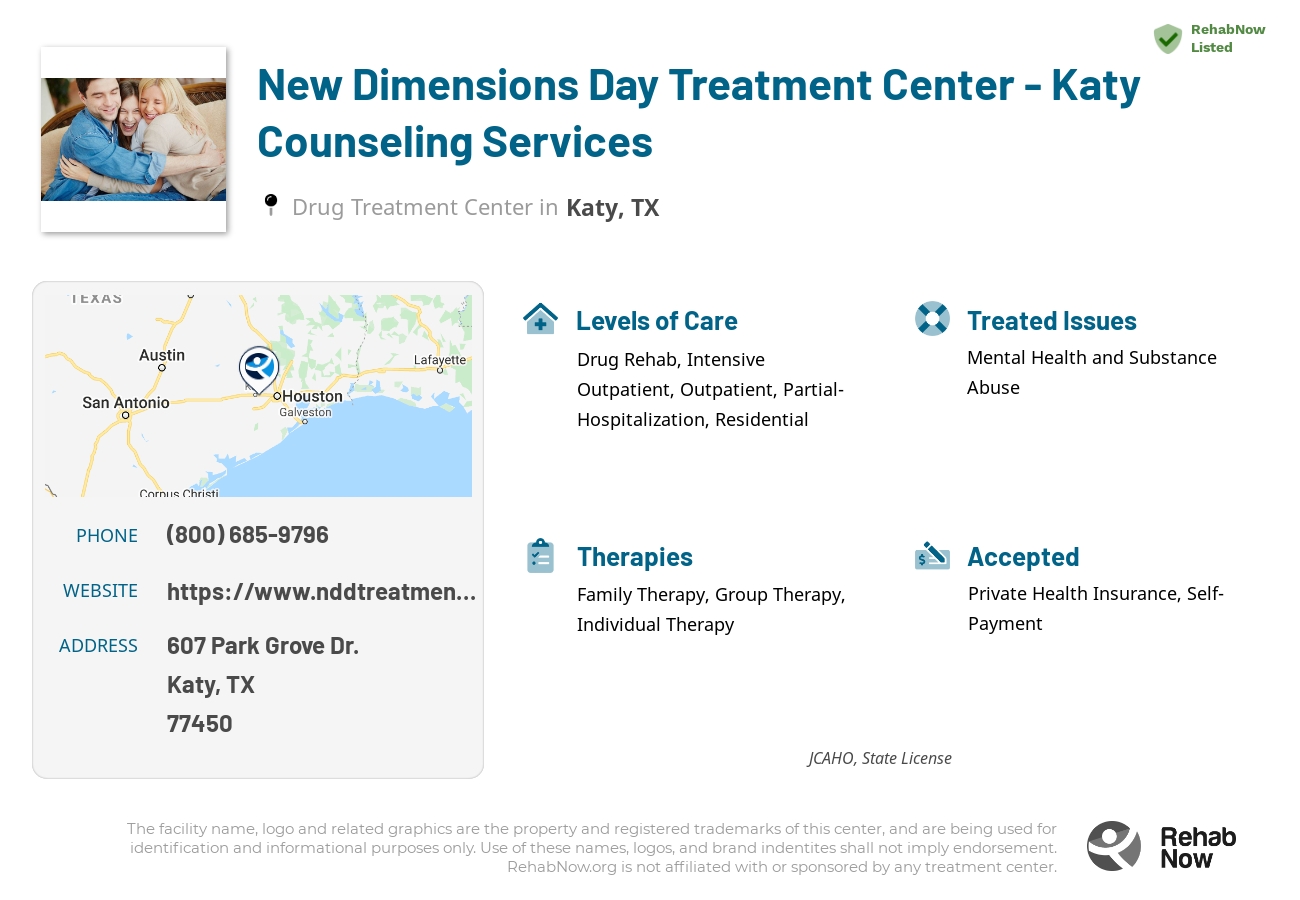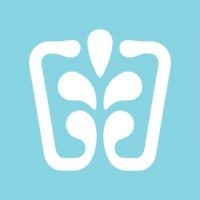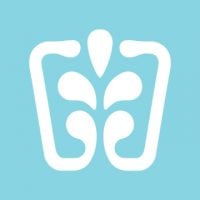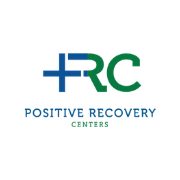New Dimensions Day Treatment Center - Katy Counseling Services
Drug Rehab Center in Katy, Texas
New Dimensions Day Treatment Center - Katy Counseling Services is a licensed and accredited drug and alcohol rehabilitation center in Katy, Texas, offering evidence-based treatments for a wide range of issues and addictions, as well as aftercare support and health education services.
About New Dimensions Day Treatment Center - Katy Counseling Services in Texas
New Dimensions Day Treatment Center - Katy Counseling Services, located in Katy, TX, specializes in providing comprehensive treatment for individuals striving to overcome substance abuse and mental health disorders. This facility stands out by offering a range of tailored programs, including partial hospitalization, intensive outpatient programs, and dual diagnosis treatment, all underpinned by accreditation from The Joint Commission.
- Partial Hospitalization Program (PHP): A full-time, structured outpatient treatment allowing clients to return home nightly.
- Intensive Outpatient Program (IOP): Offers flexibility for those with busy schedules, emphasizing peer support and intensive care.
- Dual Diagnosis Treatment: Addresses both substance use disorder and co-occurring mental health disorders, providing a holistic approach to recovery.
Accredited by The Joint Commission and licensed by the Texas Department of State Health Services, New Dimensions provides a high standard of care, with treatments including cognitive behavioral therapy, motivational interviewing, and aftercare support. Insurance plans like Kaiser Permanente, Magellan, and TRICARE are accepted, ensuring a wide reach of service.
Treatment is available for a variety of addictions and mental health issues, including opioid addiction, anxiety, and depression, using methods like 12-Step Facilitation and Dialectical Behavioral Therapy. The center offers multiple levels of care, from outpatient treatment to more intensive programs, catering to the unique needs of each client.
Genders
Ages
Modality
Additional
Accreditations
State License

JCAHO
Conditions and Issues Treated
Substance Abuse Treatment is important when getting sober, as it helps addicts learn the skills they need to live a clean life. There are many different kinds of recovery treatment, including but not limited to medication-assisted therapy, behavioral therapeutic approaches, self-help groups, and counseling. Each treatment has its benefits that help addicts recover.
Counseling can help addicts learn the skills they need to live sober lives. It can be used to treat underlying mental health issues, like depression or anxiety, that could lead to relapse. Counseling can also help people find work, deal with family problems, and learn to manage living without drugs.
With so many people addicted to opioids, we need to help those who want to quit. The cycle begins when opioid addicts take opioids for a painful injury. When someone starts taking their medication differently or in excess, it means they’re addicted and at risk of overdosing.
In , detoxing from these types of treatments is the most effective way to beat this. Most facilities begin with medical assistance and then provide counseling services; rehabilitation follows after successful treatment.
Dual diagnosis refers to someone who has both an addiction and a mental or emotional illness. Dual diagnosis treatment includes therapy for both issues simultaneously, allowing for effective treatment of either.
Sometimes people with addiction disorders also have co-occurring disorders like depression, anxiety, bipolar disorder, etc. These require specialized treatment programs that address both drug and alcohol addiction as well as psychiatric illnesses. Some rehabilitation facilities provide patients with co-occurring disorders a program with highly integrated services and a clean, distraction-free environment.
Levels of Care Offered
This center offers a variety of custom treatment tailored to individual recovery. Currently available are Aftercare Support, Dual-Diagnosis, Intensive Outpatient, Outpatient, Partial-Hospitalization, with additional therapies available as listed below.
An intensive outpatient program (IOP) is effective for drug rehab, but it can take six months to several years to complete. It’s the most popular type of drug rehab program in the United States. One example of a successful IOP success story is actor and comedian Chris Rock, sober since 1990.
An IOP allows participants to spend nights at home while attending meetings throughout the day. It’s a good way for drug addicts to make a recovery plan in an outpatient setting while still supporting their loved ones.
Alcohol or drug addiction, or co-occurring disorders, are treated in an outpatient program. The patient must attend therapy and other programs at the facility but can return home each night.
Outpatient treatment allows recovering addicts to live at home while receiving addiction treatment. Outpatients can attend group sessions for a few hours per week. Outpatients may also continue to work full time and study/attend school without interruption if they choose.
A popular way of getting drug treatment is through a Partial Hospitalization Program. These programs are short and intensive, allowing for more freedom in family visits. Patients can check in with the program anywhere from 18 to 30 hours per week but only sleep at home at night. The program may last anywhere from one to six months.
The accomplishment of completing a drug or alcohol treatment program is just the first step. Once that is complete, aftercare support comes into play. This includes helping people adjust to life without substances outside of guidelines with assistance like getting sober living accommodations and career counseling and AA/NA programs for those who are struggling between sobriety or want continued help in maintaining it once they have completed their initial rehabilitation at an addiction facility.
Aftercare comprises services that help recovering addicts readjust to normal day-to-day activities while working on specific issues. These problems include psychiatric issues, family problems caused by substance abuse, continuing education pursuits if desired during rehab, etc. These can last up to one year+ depending on what’s needed most urgently upon completion of earlier stages.
Therapies & Programs
Family therapy sessions typically involve the addict and their family members. During these sessions, a therapist will work with everyone involved to help them understand addiction and find healthy ways of coping without substance abuse.
Some addicts might feel embarrassed about their substance abuse problems. By encouraging family members to attend these sessions, therapists can show addicts that they’re not alone in dealing with addiction. Therapists can also work with family members to help them understand addiction and learn how to offer support and encouragement to their loved one as they deal with substance abuse issues.
Attending group therapy at New Dimensions Day Treatment Center - Katy Counseling Services in , is a useful way for those seeking sobriety to realize they aren’t the only one going through it.
This is when a group of people on different recovery phases get together and talk about what they’re going through, their triggers, successes, and failures. This can include alternative types of therapies too! Group therapy may occur on an outpatient or inpatient basis with groups that have no pre-existing relationships outside the session, unlike support groups where everyone already knows each other beforehand.
Trauma therapy is a form of therapy used to help people process and understand past traumas. This can help struggling addicts, as many people turn to drugs or alcohol to mask the pain of their past. Trauma therapy can be done in several ways, such as through visualization, discussion, and writing down thoughts and feelings. The goal is to help the individual understand why they are having problems coping with certain situations and changing how they think and react to things. This is often done in tandem with other therapies to treat the underlying issues associated with addiction.
The idea behind trauma therapy is that while some people can experience traumatic events and not have lasting psychiatric symptoms, many others will. In these cases, memories get hidden from consciousness but continue to influence how the person processes and copes with things in their life. They may avoid situations that resemble what happened or become suddenly angry or irritated to a situation that reminds them of a past event. With the help of a therapist, people can go back over memories and experiences. This helps them understand why they are having problems coping with certain situations and changing how they think and react to things.
This type of cognitive-behavioral therapy helps people understand how their thoughts, behaviors, and feelings are interconnected. It can help patients with borderline personality disorder gain control over their actions and stop self-harming thoughts and attempts.
Cognitive Behavioral Therapy is a type of psychotherapy that helps people address the thoughts and behaviors that may have led to their addiction. It also helps change negative thoughts into positive ones and promotes healthy communication between addicts and those around them. CBT is an efficient treatment for individuals suffering from all sorts of addictions.
Cognitive Behavioral Therapy (CBT) focuses on the underlying thoughts and behaviors that caused the problem of addiction in the first place and may cause a relapse. Negative feelings are common in drug abuse disorders, but they can lead to co-occurring disorders if not recognized. CBT involves strategies that help to change the behavior pattern by restructuring negative thoughts into positive ones. It helps to remove these feelings, and it provides long-term benefits. Also, CBT promotes self-awareness, self-control and can be administered as a mono-therapy or as part of combination therapy.
The use of Rational Emotional Behavior Therapy for addicts has been shown to have positive and desirable outcomes. It is a form of specific counseling that replaces negative and self-limiting thoughts with positive and productive behaviors. Self-defeating thoughts and habits can limit your possible successes. Some examples of this are procrastination, unhealthy eating, and angry outbursts. You may not be aware that some unhealthy behaviors and thoughts are sabotaging your potential accomplishments.
A 12-Step Program is used in treatment to help addicts stop abusing drugs and alcohol. The steps of the program include:
- Making amends.
- Believing in a higher power.
- Taking action to improve their life and admitting that they have a problem with substance use.
A cognitive restructuring step aims to change the way an individual thinks about their addiction to recover and live a life free of substance abuse. This method is extremely popular and very successful for many people who choose it as their treatment option.
Contingency Management has been found to be effective in helping people with drug addiction problems or those who are struggling with other types of addiction. Contingency Management is an approach to treatment that applies behavioral psychology to achieve abstinence or improved health outcomes. One of the goals of Contingency Management is to encourage patients by providing incentives for not using drugs or engaging in other rewarding activities. Individuals who receive CM at Drug Treatment Centers have reportedly improved retention rates for substance abuse treatment.
Payment Options Accepted
For specific insurance or payment methods please contact us.
Is your insurance accepted?
Ask an expert, call (888) 674-0062
New Dimensions Day Treatment Center Associated Centers
Discover treatment facilities under the same provider.
- New Dimensions Day Treatment Center - Woodlands Counseling Services in Spring, TX
- New Dimensions Day Treatment Center - Clear Lake Program in Houston, TX
- New Dimensions Day Treatment Center - Clear Lake Program in Houston, TX
Learn More About New Dimensions Day Treatment Center Centers
Additional Details
Specifics, location, and helpful extra information.
Katy, Texas 77450 Phone Number(800) 685-9796 Meta DetailsUpdated April 15, 2024
Staff Verified
New Dimensions Day Treatment Center - Katy Counseling Services Patient Reviews
Patrick and Regina are excellent therapists. They always make time for us. Group is a great mix of people from different backgrounds but it’s a safe and welcoming place. Cognitive behavior is a big focus on treatment as well as group sharing and classes on mindfulness. If you are open to healing, listening, sharing, and relating to other people, you will see an improvement in your well being very quickly. I think that if you come in closed minded, not appreciating what others can teach you, you may feel unsatisfied. I am very grateful for the program. Everyone in the group have been wonderful welcoming people and we become a close knit support system for each other. The therapist really help with that as well — encouraging unity and sharing. More people should use a service like this.
Katy, Texas Addiction Information
Texas is one of the primary hubs for drug smuggling into the country. The border between Texas and Mexico is more than 1,000 miles long. More than 10 million residents use alcohol every year and more than 25% of those are minors. Alcohol and drug use has become so common in Texas that almost 15% of all deaths can be attributed to these substances.
Over 7% of adults in Katy, Texas said they had used illicit drugs or abused prescription drugs. Alcohol use has been a bigger problem in the county than in the state as a whole. There were more than 30 overdose deaths for every 100,000 residents. About 11% of high school students reported they had been drunk at least once or twice within a week.
Treatment in Nearby Cities
- Cedar Park, TX (134.0 mi.)
- Sugar Land, TX (14.2 mi.)
- Dilley, TX (220.4 mi.)
- Silsbee, TX (102.0 mi.)
- Tioga, TX (264.6 mi.)
Centers near New Dimensions Day Treatment Center - Katy Counseling Services
The facility name, logo and brand are the property and registered trademarks of New Dimensions Day Treatment Center - Katy Counseling Services, and are being used for identification and informational purposes only. Use of these names, logos and brands shall not imply endorsement. RehabNow.org is not affiliated with or sponsored by New Dimensions Day Treatment Center - Katy Counseling Services.












